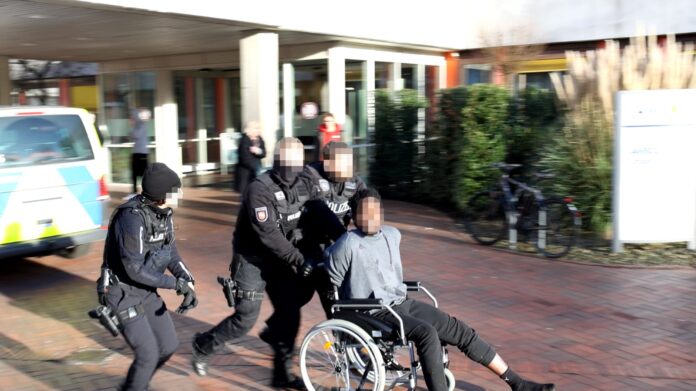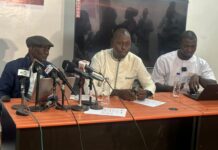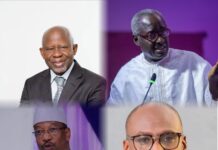
A Gambian migrant has alleged that he was forcibly deported from Germany despite facing serious health challenges on Friday after he had legally lived in Germany for several years. He claims that German police abused him by arresting him in his hospital bed and deporting him to Gambia, with a bad health care system.
According to him, he was admitted to a mental health hospital on a Saturday. However, by Tuesday, he was removed from the facility by two police officers and a doctor while still under treatment. He described the encounter as dehumanizing, stating that he felt like he was being treated “like a slave or criminal.”
Lamin, who did not want his second name disclosed due to fear, suffers from multiple medical issues, including disability, bladder problems, severe back pain, PTSD, mental illness, and hearing loss; he states that his treatment was ongoing in Germany.
In an Interview with Alkamba Times from Banjul, he expressed his concerns: “At the moment, I have lots of health issues. I am disabled, and I also have bladder problems, and my back hurts so bad. I have PTSD, mental illness, and hearing loss. All my doctors are in Germany, and I am recovering my treatment there.”
He expressed concern about the hospital staff’s involvement in this process, suggesting their actions violated legal and international standards. “The hospital staff also helped the authorities, which is not allowed in law and international laws,” he asserted. He reported his grievances to Gambian immigration officers at the airport but claimed they stated it was not their responsibility to intervene.
Lamin alleges that the authorities overseeing his case did not consider his medical certificate adequately. “Unfortunately, the authorities for my case refuse to take my medical certificate seriously. All they say is that treatment is available in The Gambia,” he explained.
He further questioned the adequacy of available medical care in his home country, saying, “I asked them to provide a special doctor or hospital in Gambia where I can get my treatment without affecting my health because changing medication is not good; it causes side effects. They say they don’t know any doctor’s name, but they believe it’s available, even though the health system in Gambia is limited.”
Lamin’s situation raises questions about the handling of deportation cases involving individuals with significant health issues and the obligations of host countries to ensure medical continuity for vulnerable migrants.
He claims to have been living independently, paying his bills, and maintaining a stable life in Germany. However, he alleges that the foreign office authorities have been uncooperative regarding his residency status.
“I don’t have any problems in Germany, and I live in my flat. I pay my bills on my own,” Lamin stated. He explained that his stay in the country was terminated after a misunderstanding with an official. “Since I have misunderstood with her, she started to fight to make sure that I leave the country even though she knows that I am ill.”
He described his struggles in renewing his documents, which were due to expire soon: “My documents are about to expire in two weeks, so I took hold of renewing them. Since I sent them the documents, it took a few weeks. I called to ask, and I spoke with one man who told me my documents were on his table, and he would make them ready and send them back.”
However, his situation took a turn when he encountered law enforcement. “I went outside to the garage, and two officers were waiting in the parking lot and asked for my ID. I showed them my disability ID, and they said I have to leave the country, and then they detained me.” Although Lamin’s lawyer intervened to secure his release, he faced further challenges with the authorities.
“Two police officers were waiting for me when I renewed my documents this year. They took me to a detention deportation center for a week, but my lawyer got me out again,” he recounted.
He emphasized the impact of stress on his health, stating, “The doctor told them that I have problems with my brain. When I get stressed, I become completely sick automatically, and it’s dangerous. I need special doctors.”
Lamin shared a distressing account of his experience with the German authorities during his hospitalization for mental health treatment.
He emphasized the urgency of his medical needs, stating, “I am here without getting my treatment and my medication,” and highlighted the importance of continued medical oversight for his serious health issues.
He possesses documentation to support his claims, asserting that the actions of the German authorities contravened international law.
Furthermore, Lamin mentioned that the authorities informed him that a doctor would be at the airport to assist with his health needs and facilitate his accommodation for treatment, but he characterized these promises as misleading and unfulfilled, which he believes is also against international legal provisions.
Meanwhile, Kemo Kebbeh, a Gambian human rights activist based in Germany, has been supporting Lamin and vehemently objected to Lamin’s recent deportation.
He described Lamin’s deportation as illegal and a violation of human rights, highlighting that no support was provided for Lamin upon his arrival at the airport. Kebbeh expressed concern over issuing an emergency passport to someone undergoing medical treatment, pointing out that the necessary healthcare services are unavailable in Gambia.
He criticized the actions of the German authorities, stating that police brutality must end, referencing other individuals who have faced similar circumstances. Additionally, Kebbeh expressed disappointment in the Gambian government, particularly the interior and foreign ministries, for their perceived lack of action in protecting their citizens abroad.
Kebbeh also raised concerns about the role of Gambian immigration officers stationed in Germany, arguing that their identification of Gambians to German authorities often leads to deportation. He noted that this situation has created a climate of fear within the Gambian community in Germany, where individuals hesitate to communicate in their local languages.





